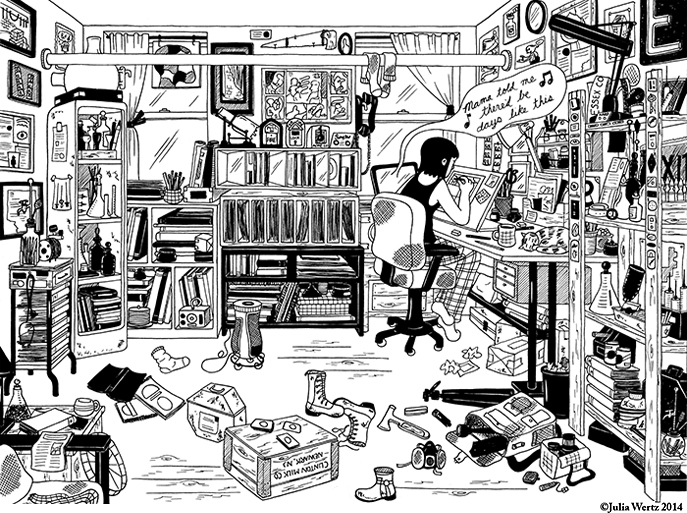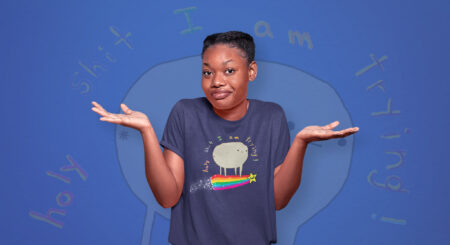Julia Wertz’s autobiographical comics (which she started posting on a blog in her early twenties with the title, The Fart Party) are about the tension between lightness and darkness, about silliness and pain. Maybe that’s why it makes sense that Julia’s comics are black and white and reminiscent of the comics we read as children in the newspaper, yet contain the kind of “mature audience only” content that would never have been approved to be printed in those newspapers.

When I told Julia that her cartoon persona (which looks nothing like her) reminded me of Jon Arbuckle from Garfield, she responded,
“Oh man, Jon is one of the most depressed characters in comics. I can totally relate. That kind of cartoon still gets in the way for me, meaning I still draw really cartoony sometimes, which feels strange when I’m addressing something super serious. I remember drawing one panel where my character is contemplating suicide, and I was like I’m gonna draw this bug eye kinda wonky so it looks funny. I’m not sure if that’s a good idea or not though, but it’s just how I do it.“
Even though Julia sees that cartoony style as “getting in the way” at times, it creates an interesting aesthetic; having the artistic style be at odds with the gravity of the content brings the reader into Julia’s own internal struggles. Julia’s earliest comics have gags, like a traditional comic strip, but as she has matured as an artist, Julia’s work has become less gag-driven, more emotional, and (although her comics are still funny) at their best, express an emotion more challenging to render than a good old-fashioned “LOL!” moment: the bitter-sweetness of living.

Julia has chronicled her diagnosis with systemic lupus in her comic, The Infinite Wait, which is collected in her book by the same name. In 2014, Museum of Mistakes: The Fart Party Collection was released, which collects all of Julia’s early comics and contains mini-essays about her life, sketches, and her hilarious responses to some of her favorite negative reviews of her work.
Julia is also a recovering alcoholic, and her relationship with alcohol—a silly, youthful joke in her early work that becomes an increasingly ominous force, especially in her graphic memoir, Drinking at the Movies—is a recurring topic throughout her comics. She wrote a piece about her addiction to alcohol that was published in Narratively. Julia has also been nominated for Eisner Awards for Drinking at the Movies and The Infinite Wait.
 Last year, Julia, who is also an amateur historian and avid urban explorer (Julia writes about her urban exploring on her blog, Adventure Bible School), began writing comics about NYC history for The New Yorker’s bl
Last year, Julia, who is also an amateur historian and avid urban explorer (Julia writes about her urban exploring on her blog, Adventure Bible School), began writing comics about NYC history for The New Yorker’s bl og. Her work there got her a job at Harper’s blog, creating illustrations of city blocks and streets at different periods of history. She is currently working on a book of cityscapes that will be released in 2017 from Black Dog & Leventhal. She also continues to publish her autobiographical comics through the independent publisher Koyama Press and has recently started writing a spoof advice cartoon with her brother for The Believer.
og. Her work there got her a job at Harper’s blog, creating illustrations of city blocks and streets at different periods of history. She is currently working on a book of cityscapes that will be released in 2017 from Black Dog & Leventhal. She also continues to publish her autobiographical comics through the independent publisher Koyama Press and has recently started writing a spoof advice cartoon with her brother for The Believer.
What artist, writer, or totally awesome person are you a fan of?
Comics is a great genre; you often end up becoming friends with people you admire, because it’s such a small field. So for that sake, I’m going to change this question to Who would you have dinner with, dead or alive? In that case, I pick Dr. Thomas Mutter. He was a surgeon in the 1800’s who created insane surgeries for severely deformed people. I would just love to sit at a dinner and hear all his stories. Not sure I’d get much eating done though. Maybe we should just meet for coffee.
Recently, especially with online writing, it has become increasingly popular for people to write about their worst experiences, their meanest and pettiest thoughts, etc. Last year, Slate published a great essay about this trend – The First-Person Industrial Complex. How do you feel about writers baring all? Does it make you uncomfortable when you see young people writing about their painful experiences to break into the writing industry?
I have a love/hate relationship with the trend. If pain is written about honestly, with just the intention of needing/wanting to get it on paper, and not for monetary purposes, then it can be therapeutic at the worst, and a great read at best. But when it’s clear the writer made a conscious choice to exploit their own suffering with only the desire to break into the industry or sell a book, and it’s clearly not written with anything but that in mind, then it becomes dishonest and forced. When writing about a personal, painful situation, you have to write it for yourself first.
I always advise new writers/cartoonists to write for yourself, edit for an audience. If you’re writing for an audience right off the bat, you’re not making the work you really want to make, and the piece will lose the essence of what makes it good, unique, and interesting to read. Don’t underestimate your readers, they know when you’re bullshitting.
The other thing I hate about that style is people who treat their pain disproportionately, like as if this small instance was the WORST THING EVER. It lacks perspective and is embarrassing for the writer. Which isn’t to say I don’t address petty issues in my work, that’s my bread and butter, but I make it clear that I know they’re petty. Just, know your place in life before you write about life. Like when I write about having systemic lupus or being a recovering alcoholic, I remind myself that even though times were shitty, I’ve always had a roof over my head, food to eat, and people who love me, so I’m okay. If you have those things, you’re lucky, so keep that in mind. I don’t mean to downplay or negate suffering, people only know what they know, but just keep an overall idea of perspective in mind.
Part of me cringes when I see a young writer putting something really personal out there without any self-awareness, but another part of me is like, eh, who cares. Clearly they’re not self-aware enough to understand that was a mistake, but even so, what does it matter to me?
 I actually regret not putting more personal stuff into my early work. What was happening back then was I was using lighthearted comics to cover up what was really going on with my family and that’s why the material is about bullshit like cookies, drinking, bikes, dumb jokes, etc.
I actually regret not putting more personal stuff into my early work. What was happening back then was I was using lighthearted comics to cover up what was really going on with my family and that’s why the material is about bullshit like cookies, drinking, bikes, dumb jokes, etc.
I got lucky in that it worked perfectly for what I was doing, putting the serious stuff in there would have been jarring and inconsistent. What was happening in real life was too painful to write about, but the comic was still about me, so I offered up something else embarrassing or personal to deflect from what was really going on, but it still felt intimate. It wasn’t a conscious choice though. Nothing I did in my first few books was conscious, I was just writing some comics while living a very complicated and painful life that I mostly kept out of my work until later. So ultimately, that makes me unqualified to tell people how to write their early work, since I had no idea what I was doing and had no objective.
What is your creative process?
I always feel like my answer to this question is disappointing, because if I’m working on my autobio stuff, all I do is wake up, drink coffee, fuck around with the cat, and then get to work. Work is then just writing, penciling, inking, and scanning. I don’t do anything special or inspiring. But if I’m working on a history or cityscape piece, it’s more complicated.
History pieces require hours and hours of research, and cityscapes require finding a good historic photograph, then going to that location and finding what it looks like now, matching the angle, taking a reference photo, and then going home to draw it. I can waste a whole day just getting one reference photo. I guess I’d also consider long walks to be part of my process. When I’m feeling frustrated, I like to take a break and walk around the city. It’s the only way to clear my head and figure things out that I’m stuck on. Or to come up with new material, since NYC is an endless well of entertainment.

What is your favorite part of the creative process?
Inking. There’s this one café I like to go to when I have to ink, because it has a bar table in the front window, and when the sun hits the paper at the right angle, the threads on the paper stand out and inking over them is very satisfying.
How do you deal with rejection?
When I was a kid, my mom taught me that “you’re not for everyone,” meaning I had a very strong personality that not everyone liked, and that was okay. It sounds harsh but it’s a really good lesson for any creative person to learn. Hell, anyone in general. We live in a world of widely varying opinions, there’s no way everyone will agree on one thing, and thank god, otherwise everything would be super agreeable and boring. So when I get rejected, I just think, that’s okay, it’s not for everyone, but as long as I like it, and maybe a few others, then it’s fine.
 Recently, you did an interview with Curbed about your apartment. I was floored at some of the awful things people said in the comments section. What was it like to have this fun little interview be so divisive to readers?
Recently, you did an interview with Curbed about your apartment. I was floored at some of the awful things people said in the comments section. What was it like to have this fun little interview be so divisive to readers?
Haha…yeah, those commentators were so upset by the way I chose to decorate my apartment. It was bizarre. But I expected it. Sites like Curbed, that are huge and anonymous (like not run by one person) tend to attract really negative comments, because of the anonymity aspect. I expected people to hate the way I decorate, because for some hilarious reason, decoration aesthetics are a polarizing subject for many people, but I didn’t expect them to attack my personal life the way they did. But it didn’t bother me on a personal level, it bothered me on a very basic, fundamental level of irrationality. Like it’s bizarre to suggest that someone must be insane just because they don’t like the same decorations as you do.
But at the same time, that kind of stuff cracks me the fuck up. I love it when people are weird and super-insistent about their shitty opinion. It’s pure entertainment.

Since last year, you have been writing comics about NYC history for The New Yorker. How did you get this cool job?
I still can’t believe I have this gig. I was so lucky to get it, and I owe it all to Roz Chast. I struck up an email correspondence with her after I heard she liked one of my books, and we became fast friends. I went up to her house in Connecticut and she was basically like, “here’s the key to The New Yorker, god speed.”
That key, of course, was immediate contact with Bob Mankoff, who does the comics there. Originally he wanted me to do gag comics for print, but that’s not my thing, so I pitched a longer series of history comics. I knew that would mean they’d only run online and pay a lot less, but I know myself well, and I can’t force myself to do what I don’t want to do. Luckily, he liked the idea and it just took off from there. I was able to spin that into a series of cityscapes at Harper’s.
It’s still so weird to me that I work for The New Yorker and Harper’s. My first book was called Fart Party, for fuck’s sake. No one, myself included, ever thought I would have a fancy resume like that. But I’m sticking to my roots, like I enjoy seeing how many times I can get The New Yorker to print a fart joke. Or the one time I did do a gag for print; it was a joke I wrote with my brother that involved a knitted Drake doll, which was funny just to us, but probably not the general New Yorker readers.

In a fight between tan and grey, which would win and why?
Grey. It’s all encompassing and persistent.
Periodic Table, City Map, or Color Wheel?
In the past I’d say city map, because I love maps, but I’m reading the Disappearing Spoon and now I’m gonna say periodic table, because there are so many more options in directions to take it. The periodic table is basically life itself, it’s infinite.
If you could punch someone or something in the face, who would it be?
I used to have an answer for this that involved a bunch of religious figures who plunged science and medicine into the dark ages, but now and probably for always, I’ll just say Trump.
Do you have a profession that you have a deep reverence for?
Social workers and counselors. They see the most horrendous things, and they devote their time to helping, often for hardly any money, and do more work for others in a day than most of us will do in a lifetime. I could spent my whole life making great art, and there’s a high probability it won’t ever help a single person. Sure it might entertain, but the world needs more helpers than it needs a dancing monkey.

Do you have a contemporary issue or cause that is particularly important to you?
The treatment of mental illness is still barely out of the dark ages. We only recently just stopped throwing everyone in asylums, and we still over- (and under-) medicate people and have a very poor understanding of mental illnesses. Many doctors treat the DSM like the bible, when it is merely a suggestion of the latest thinking in medicine. It is by no means the answer. Only within the last 200 years did we start even attempting to treat mental illness in America, and while we know so much more than we used to, we don’t know nearly enough. In another 200 years we’ll look back on now as the beginning of climbing out of the dark ages of treatment.

Let’s talk about your Urban Exploring. Can you tell us a little about it. Do you have a favorite place you’ve visited?
I started doing it as a way to get out of the house and travel, but then I got obsessed with it and basically took two years off comics to do it all the time. What I love about it is that when you’re roaming through an abandoned building, you can’t think about anything but what is right in front of you. And it’s just really fun. My favorite place is a Kirkbridge Plan asylum in New Jersey called Greystone, but it was demolished last year.

As an urban explorer, much of what you do is illegal. How do you feel about the laws regarding visiting abandoned places? Also, have you discovered a weird or crazy archaic law in your research that made you laugh or appalled you?
In all practicality, I side with the law. Those places are dangerous, and people are dumb. What I don’t side with is $500 trespassing tickets to photographers. Most of my law research has only been in attempt to clear up time lines, like figuring out how long I have to wait until I can publicly discuss visiting place x, or showing patient files from place z, which are all statute of limitations for trespassing offenses. But there are a lot of hilarious archaic laws like the making of bubble gum or ice cream illegal in certain towns, which of course aren’t upheld but have just never been amended.
I think it comes down to what (few) ethics I have. If a place like an asylum is just city owned and going to be demolished, I’ll talk openly about going and about taking relics from it, as an act of preservation, so those things don’t end up in a landfill. But if it’s a house and/or clearly private property, I won’t talk about it’s location and I won’t take anything, because someone owns it and that’s a shitty thing to do. But I will still break in and look around and take photos. But for most of these places, “breaking in” just means shoving a door open or climbing through an already broken window.

In your forward to Drinking at the Movies, you provide some tried and true advice for people moving to New York City. One of them is to “lie on your resume.” I’ve heard this advice before from other people. Do you still stand by it?
Hell yeah. Well, depending on the job. Most my advice for job hunting was about the service industry. But make sure you can back it up with skill. Like if you say you worked as a bartender, you better have worked as a bartender, because you can’t fake that skill. But if you’re a competent person and a hard worker, you can probably pull it off, and you should at least try. New York doesn’t play nice, and neither should you.
What are five of your favorite books?
Blood and Guts, A History or Surgery by Richard Hollingham; Mad in America by Robert Whittaker; The Lost City of Z by David Grann; The Glass Castle by Jeannette Walls; Working Stiff by Judy Melinek MD

Do you have any other advice you would like to give aspiring writers or artists?
The only advice that is worth anything can be found in these two quotes about the same thing:
“Amateurs sit and wait for inspiration, the rest of us just get up and go to work.” — Stephen King
“A writer who waits for ideal conditions under which to work will die without putting a word to paper.” — E.B. White
However, this is advice for people who have more time and less responsibility. Life is very different when you’re an adult with a job, kids, and other responsibilities. You can’t just make your art whenever you want, and it’s frustrating for me to hear artists give blanket advice about creating art constantly. They can say that because they have the time to do that.
I know what they mean though, I say it all the time too, and all we’re saying is if you really want to be creating art (and you have the time) then you will be doing it no matter what. You won’t be waiting for money, or a book deal, or accolades, you’ll do it under any and all conditions. But that doesn’t mean that the person who doesn’t have the time to create anything isn’t talented. I know a lot of insanely talented people whose lives just took a different turn and they couldn’t devote their time to art. I would argue some of them are far more talented than many of those who do have the time.
(Note: For the readers that are already fans of Julia’s work, you’ll be happy to hear that she has just put a whole mess of her original art up for sale on her website. You can see it it here.)
Women & Comics is a monthly interview series. You can read past interviews with Nicole J. Georges, Lucy Knisley, and Eleanor Davis.








